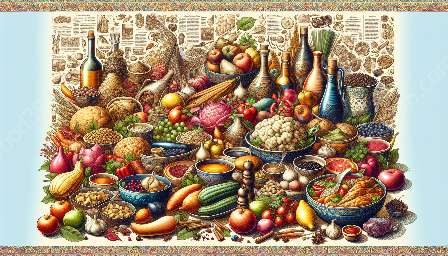Dietary habits and nutrition in early cultures played a vital role in shaping the development of human civilizations. As societies transitioned from hunter-gatherer lifestyles to early agricultural practices, their food cultures evolved significantly. In this article, we will explore the evolution of dietary habits and nutrition in early cultures, their connection to the development of food cultures and the impact of early agricultural practices. We will also delve into the origin and evolution of food culture through various historical periods.
Early Agricultural Practices and Food Cultures
The shift from nomadic hunter-gatherer lifestyles to settled agricultural communities marked a pivotal point in human history. Early agricultural practices enabled communities to domesticate plants and animals, leading to a more reliable and sustainable food supply. This transition also contributed to the development of distinct food cultures, as communities utilized local resources to create unique culinary traditions.
As early societies cultivated crops and raised livestock, their dietary habits underwent significant changes. The introduction of staple crops such as wheat, rice, and maize, along with domesticated animals like cattle and pigs, became fundamental to their nutrition. These agricultural practices not only shaped the types of foods consumed but also influenced cooking techniques, food preservation methods, and culinary traditions.
Origin and Evolution of Food Culture
The origin of food culture can be traced back to the earliest human societies, where food served as a means of sustenance and social cohesion. Over time, as communities developed agricultural practices and settled into specific regions, their dietary habits and culinary traditions began to form distinct food cultures. The evolution of food culture was influenced by various factors, including environmental conditions, trade routes, cultural exchanges, and religious practices.
Early civilizations, such as the ancient Egyptians, Greeks, and Romans, created sophisticated food cultures that reflected their agricultural practices, social hierarchies, and religious beliefs. These early food cultures laid the groundwork for the diverse culinary traditions that continue to shape global cuisine today.
Adaptation of Dietary Habits and Nutrition
Early cultures adapted their dietary habits and nutrition to suit their local environments and available resources. In regions with abundant seafood, such as coastal areas, fish and shellfish became prominent sources of protein. In contrast, communities in arid regions relied on drought-resistant crops and desert-adapted livestock for sustenance.
The adoption of plant-based diets or meat-heavy cuisines was often influenced by geographic factors, agricultural capabilities, and cultural customs. Furthermore, the development of food preservation techniques, such as fermenting, drying, and pickling, enabled early cultures to extend the shelf life of perishable foods and diversify their culinary offerings.
Impact of Trade and Cultural Exchange
Trade routes and cultural exchange played a significant role in shaping the evolution of food culture. Ancient trade networks, including the Silk Road and the Spice Routes, facilitated the exchange of culinary ingredients, cooking methods, and food traditions between distant civilizations. This interchange resulted in the assimilation of new flavors, spices, and cooking techniques into local food cultures, enriching and diversifying culinary practices across regions.
Additionally, cultural exchange through conquests, migrations, and colonial expansions introduced new foodstuffs and culinary practices to different parts of the world, further influencing the evolution of food culture. As cultural boundaries blurred, diverse ingredients and cooking styles merged, giving rise to fusion cuisines that reflected the interconnectedness of global food cultures.
Legacy of Early Dietary Habits and Nutrition
The dietary habits and nutritional practices established by early cultures continue to influence modern food culture. Many traditional food customs and culinary techniques have persisted through generations, forming the foundation of contemporary gastronomy. Furthermore, the historical significance of early agricultural practices and food cultures has shaped the way we understand and appreciate food as an essential component of cultural heritage.
By examining the evolution of dietary habits and nutrition in early cultures, we gain insight into the interconnected relationship between human societies and the food they consume. Understanding the origin and evolution of food culture offers a deeper appreciation for the diverse culinary traditions that enrich our global culinary landscape.


